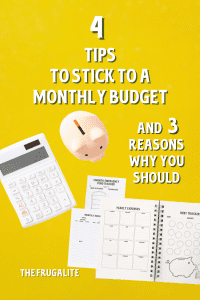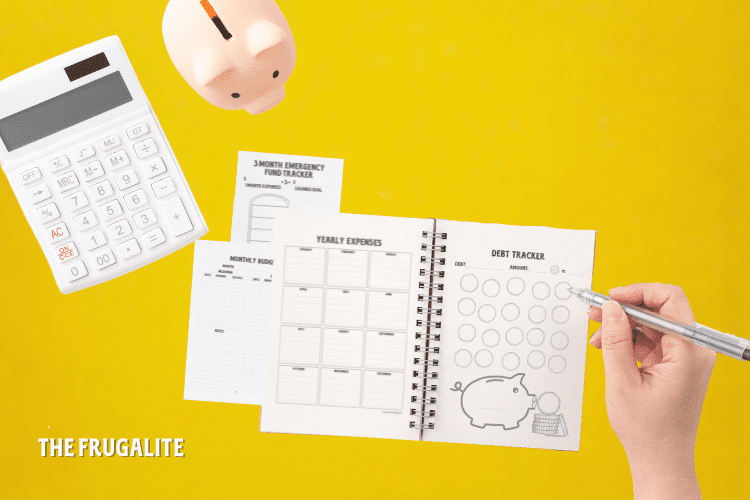(Psst: The FTC wants me to remind you that this website contains affiliate links. That means if you make a purchase from a link you click on, I might receive a small commission. This does not increase the price you’ll pay for that item nor does it decrease the awesomeness of the item. ~ Daisy)
When it comes to sticking to a budget, it can get pretty difficult. Especially if it’s something you’re not used to. That being said, having a budget that you keep track of regularly can do wonders for your finances. Not only will it help you spend less (especially on impulse buys), but it will also help to give you a better understanding of your finances in general. Not sure how to make a budget? Daisy has a great article here.
While there are countless tips and tricks to sticking to a budget, here are 4 that work best for me and 3 reasons why having and keeping track of your budget is vital to your financial well being.
1. Make it easy
Doing things to make your budget easier also helps make coming back to your budget easier. One of my favorite ways to do this is by using ready-made budget sheets and debt trackers like the ones I’ve designed. These make it super easy to fill in the details and organize them in a binder. When you have a system, especially one that requires less preparation to set up, it also means it will take less time and effort to maintain.
2. Make it fun
Money can stress out many people, especially if they’re in the process of getting their finances on track. After all, we often procrastinate on the things we struggle with. When you take the time to make your budget fun, it can make it less stressful and a bit more enjoyable. One of my favorite ways to do this is by using fun budget trackers like these and adding lots of bright colors as I fill them out. What can I say? I’m a colorful person!
Another way to make it fun is to do it alongside something you enjoy. For example, every time you sit to do your budget, you could warm up one of your favorite baked goods with a nice cup of tea to enjoy. Or, you could treat yourself to an episode of your favorite tv shows, or a movie you’ve been looking forward to on a streaming service you already use.
3. Schedule it
Having a standard schedule that you stick to for budget upkeep is extremely important. What that schedule looks like may differ, but the fact remains that having a set time will help. Personally, I like to do my budgeting on Sundays. Once a month, I’ll do a big monthly budget overview for the coming month about a week before the first of the next month. I also like to touch base on my budget weekly to make sure I’m staying on track, write down my expenses and bills I’ve paid, and jot down any notes for upcoming expenses I might have. (A yearly expense tracker is great for this!)
How and when you schedule time to focus on your budget can differ a lot depending on how many people are involved in the finances. Maybe there are only a couple of days a month when everyone can be home and sit down to look, or maybe it’s something that has to be looked at in the evening after work.
To stay on schedule, I personally write down in my planner and my phone calendar (which sends me reminders) when I plan to sit down and work on my budget. When it’s written down, I’m much more likely to stay committed.
4. Get accountability
Accountability for anything can make a huge difference, especially something as important as finances. As a single person with no dependents, I don’t have accountability within my home, but I do have friends to whom I stay

accountable. This doesn’t mean I tell them everything about my finances, but rather just a quick “Hey, updated my budget today, have you done yours this week?” Though, we’ll often go more in-depth.
If, unlike me, you live in a household with partners or people you share finances with, keeping each other on track and setting regular meetings as a family will help a lot. I firmly believe that kids should be taught about money and budgets, and since most public school systems don’t touch on it much, it usually falls to parents or family to teach. When you include your kids in your regular budgeting sessions, not only will it help them gain a grasp on money early on, but if it’s something they enjoy, there’s no way they’ll let you forget about your weekly budget meeting!
If your kiddos are still a little too young to grasp the household budget, if they receive an allowance, it would be great to sit down with them and help them budget their allowance before moving on to your own finances.
You’ll have a better understanding of your finances
When you pay attention to your finances, you start to understand them better. You’ll recognize patterns in your spending, and you’ll also be more knowledgeable about the things you actually need and the things you buy and don’t need. When you notice where you spend your money, it often helps to make it easier to cut back on the things you don’t want to be purchasing, and instead, helps you decide where you’d be better off spend your money. It also makes the choice easier when it’s all laid out on paper in front of you.
This doesn’t mean you shouldn’t have fun money, or money dedicated to eating out or a bit of shopping, but it does mean planning it ahead of time. Give yourself a set amount monthly or weekly for those types of things.
Out of sight, out of mind
When it comes to finances, the saying “out of sight, out of mind” often comes to my mind. Not only is it relevant to finances but to most things in life (after all, versions of the phrase have been used since the 1500’s, if not earlier). When you don’t pay attention to what you’re spending regularly, it gets very easy to lose track and spend more than you intended.
On the other hand, if you regularly look at your budget and finances, even if it’s just a quick glance, it keeps it at the forefront. It helps you to remember and stay on track as the month progresses. I keep my trackers in plain view, on my fridge with colorful magnets.
The more you do it, the easier it gets
And lastly, I like to think of finances and budgeting like a muscle. Just like any muscle, the more you use it, the stronger it gets. The more you practice, the better you’ll get at managing your money. This doesn’t mean you’ll do perfectly in your first month; heck, it may even take a few months to really get the hang of it. But, if you dedicate the time and energy to consistently using and sticking to a budget, it will start to get easier.
What are your budget tips and tricks?
With the importance of budgets, and the variety of ways to maintain them, and tricks to stay consistent, I’m sure I’ve missed some on this list. What are your favorite ways to stay on track with your budget? Have you tried things that haven’t worked for you? Let’s discuss this in the comments!
About Chloe Morgan
Chloe Morgan grew up living with a tight budget. In her late teens and early 20’s, all the lessons she’d learned started to slip, like it does for many college-age students on their own for the first time with their first credit card. As she’s gotten older, she’s started to deal with the repercussions and has taken on a frugal way of living, keeping her costs low, as she pays off debt and saves for her future. Chloe lives in Northern Ontario, Canada, with her dog, Rhea.
Check out her work on TheOrganicPrepper.com and TheFrugalite.com where she writes about food, frugality, finances, and self-reliance, or her work on Medium, where she writes about lifestyle, mental health, and writing.










